Related Research Articles
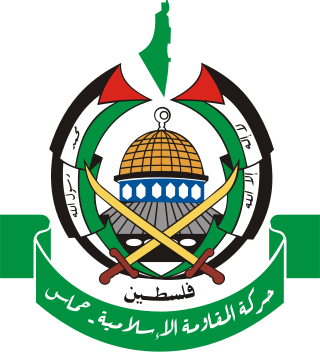
The Islamic Resistance Movement, abbreviated Hamas, is a Palestinian nationalist Sunni Islamist political organisation with a military wing called the Izz al-Din al-Qassam Brigades. It has governed the Israeli-occupied Gaza Strip since 2007.

The Israeli–Palestinian conflict is an ongoing military and political conflict about land and self-determination within the territory of the former Mandatory Palestine. Key aspects of the conflict include the Israeli occupation of the West Bank and Gaza Strip, the status of Jerusalem, Israeli settlements, borders, security, water rights, the permit regime, Palestinian freedom of movement, and the Palestinian right of return.

Palestine, officially the State of Palestine, is a country in the southern Levant region of West Asia recognized by 146 out of 193 UN member states. It encompasses the Israeli-occupied West Bank, including East Jerusalem, and the Gaza Strip, collectively known as the occupied Palestinian territories, within the broader geographic and historical Palestine region. Palestine shares most of its borders with Israel, and it borders Jordan to the east and Egypt to the southwest. It has a total land area of 6,020 square kilometres (2,320 sq mi) while its population exceeds five million people. Its proclaimed capital is Jerusalem, while Ramallah serves as its administrative center. Gaza City was its largest city prior to evacuations in 2023.
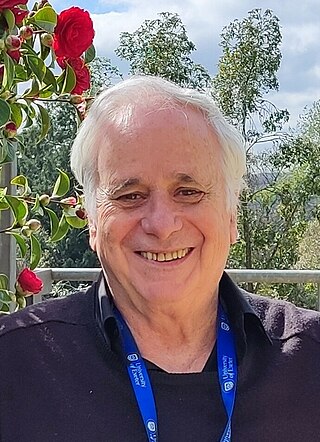
Ilan Pappé is an Israeli historian, political scientist, and former politician. He is a professor with the College of Social Sciences and International Studies at the University of Exeter in the United Kingdom, director of the university's European Centre for Palestine Studies, and co-director of the Exeter Centre for Ethno-Political Studies. Pappé was also a board member of the Israeli political party Hadash, and was a candidate on the party list in the 1996 and 1999 Israeli legislative elections.

Germany–Israel relations are the diplomatic relationship between the Federal Republic of Germany and the State of Israel. After the end of World War II and the Holocaust, relations gradually thawed as West Germany offered to pay reparations to Israel in 1952 and diplomatic relations were officially established in 1965. Nonetheless, a deep mistrust of the German people remained widespread in Israel and the Jewish diaspora communities worldwide for many years after. Relations between East Germany and Israel never materialised. Israel and Germany now maintain a "special relationship" based on shared beliefs, Western values, and a combination of historical perspectives. Among the most important factors in their relations is Nazi Germany's genocide of Jews in Europe during the Holocaust.
Antisemitism at universities has been reported and supported since the medieval period and, more recently, resisted and studied. Antisemitism has been manifested in various policies and practices, such as restricting the admission of Jewish students by a Jewish quota, or ostracism, intimidation, or violence against Jewish students, as well as in the hiring, retention and treatment of Jewish faculty and staff. In some instances, universities have been accused of condoning the development of antisemitic cultures on campus.
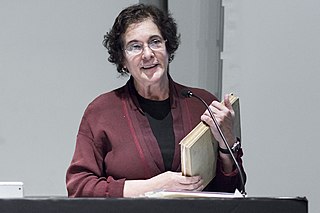
Lila Abu-Lughod is an American anthropologist. She is the Joseph L. Buttenweiser Professor of Social Science in the Department of Anthropology at Columbia University in New York City. She specializes in ethnographic research in the Arab world, and her seven books cover topics including sentiment and poetry, nationalism and media, gender politics and the politics of memory.
Sara M. Roy is an American political economist and scholar. She is a Research Associate at the Center for Middle Eastern Studies at Harvard University.

Nur ad-Din Masalha, commonly known as Nur Masalha, is a Palestinian writer, historian, and academic. His work focuses on the history, politics, and theology of Palestine, including themes such as the Palestinian Nakba, Zionism, and liberation theology.
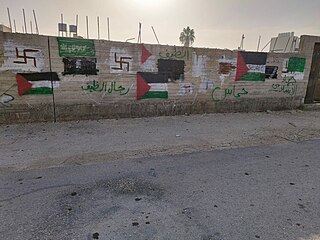
Racism in the Palestinian territories encompasses all forms and manifestations of racism experienced in the Palestinian Territories, of the West Bank, Gaza, and East Jerusalem, irrespective of the religion, colour, creed, or ethnic origin of the perpetrator and victim, or their citizenship, residency, or visitor status. It may refer to Jewish settler attitudes regarding Palestinians as well as Palestinian attitudes to Jews and the settlement enterprise undertaken in their name.

The lives of Palestinian women have transformed throughout many historical changes including Ottoman control, the British Mandate, and Israeli control. The founding of the Palestine Liberation Organization in 1964 and the later establishment of the Palestinian Authority in 1994 also played a role in redefining the roles of women in Palestine and across the Palestinian diaspora. Arab women have been involved in resistance movements in Palestine, Jordan, Syria, and Lebanon throughout the 20th century and into the 21st century.
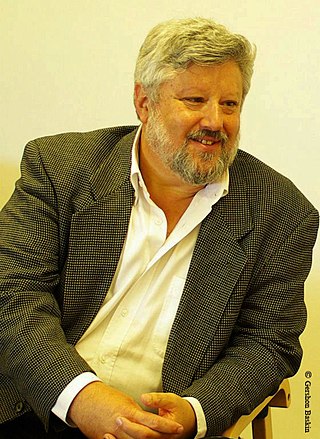
Gershon Baskin is a social and political activist, and a researcher of the Israeli–Palestinian conflict and peace process and an Israeli columnist. In 2024, Baskin, together with Samer Sinijlawi initiated the joint proposal for Israeli Palestinian peace between the former Prime Minister of Israel, Mr. Ehud Olmert and the former Minister of Foreign Affairs of the Palestinian Authority, Mr. Nasser AlKidwa. https://www.washingtonpost.com/opinions/2024/10/04/olmert-al-kidwa-gaza-peace-plan/ The two former leaders, agreed to work together to promote the achievement of peace between the Palestinian and Israeli peoples and peace in the Middle East in general through an agreement that provides for the State of Palestine alongside the State of Israel on the basis of 1967 borders living in peace and security on the basis of mutual recognition. In 2022–2023,, Baskin was running three separate secret back channels between significant Israelis and Palestinians mainly looking toward the day after the leadership of Netanyahu and Abbas and the required political changes that would have to take place in Israel and Palestine.
Nadim Rouhana is Professor of International Affairs and Conflict Studies and the Issam M. Fares Chair in Eastern Mediterranean Studies at The Fletcher School. Before joining the Fletcher School in 2008, Rouhana held teaching positions at Israeli, Palestinian, and American universities including Harvard University, Tel Aviv University and George Mason University. His research is published in Arabic, Hebrew, and English. Rouhana’s research has been supported by numerous foundations, including The Ford Foundation, MacArthur Foundation, The Luce Foundation, and the United States Institute for Peace. Rouhana is also the Founding Director of Mada al-Carmel—The Arab Center for Applied Social Research in Haifa, which undertakes theoretical and applied social research and policy analysis to broaden knowledge and critical thinking about the Palestinians in Israel, equal citizenship, and democracy. Mada’s research focuses on Israeli society, Palestinian society, dynamics of conflict, settler societies and decolonization, collective rights, and alternatives to partition. While at Mada, he led a process that brought together about fifty political, academic, and civil society leaders from the Palestinian citizens in Israel that deliberated for more than one year on a vision document to define the relationship between Israel and its Palestinian citizens. The documented, The Haifa Declaration, was endorsed by hundreds of community leaders.
Evgeny Finkel or Eugene Finkel is a political scientist and historian at Johns Hopkins University who studies political violence, genocide, East European and Israeli politics, and Holocaust studies. In April 2022, Finkel claimed that after the initial phase of the 2022 Russian invasion of Ukraine was resisted by Ukrainian armed forces, the aims of the invasion evolved, and the combined evidence of widespread war crimes, including the Bucha massacre, together with genocidal intent, as illustrated by the essay What Russia should do with Ukraine published in RIA Novosti, established that genocide was taking place.
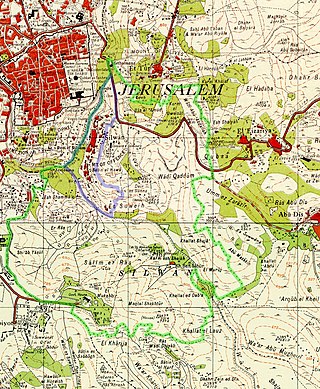
Wadi Hilweh is a neighborhood in the Palestinian Arab village of Silwan, intertwined with an Israeli settlement called the City of David. The neighborhood is called after a section of the central valley of ancient Jerusalem, which it straddles.

Death to Arabs is an anti-Arab slogan it is often used during protests or disturbances across Israel, the West Bank, and to a lesser extent, the Gaza Strip. Depending on the person's temperament, it may specifically be an expression of anti-Palestinianism or otherwise a broader expression anti-Arab sentiment, which includes non-Palestinian Arabs. It is widely condemned, with some observers asserting that it manifests genocidal intent.
"Ongoing Nakba" is a historiographical framework and term that interprets the Palestinian "Nakba" or "catastrophe" as a still emerging and unfolding phenomenon. The phrase emerged in the late 1990s and its first public usage is widely credited to Hanan Ashrawi, who referred to it in a speech at the 2001 World Conference against Racism. The term was later adopted by scholars such as Joseph Massad and Elias Khoury. As an intellectual framework, the "ongoing Nakba" narrative reflects the conceptualisation of the Palestinian experience not as a series of isolated events, but as "a continuous experience of violence and dispossession", or as other have termed it, the "recurring loss" of the Palestinian people.
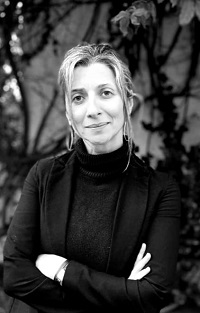
Francesca P. Albanese is an Italian international lawyer and academic. On 1 May 2022, she was appointed United Nations (UN) Special Rapporteur on the occupied Palestinian territories for a three-year term. She is the first woman to hold the position.
Nakba denial is a form of historical denialism pertaining to the 1948 Palestinian expulsion and flight and its accompanying effects, which Palestinians refer to collectively as the "Nakba". Underlying assumptions of Nakba denial cited by scholars can include the denial of historically documented violence against Palestinians, the denial of a distinct Palestinian identity, the idea that Palestine was barren land, and the notion that Palestinian dispossession were part of mutual transfers between Arabs and Jews justified by war.

Allegations have been made that the 2023 Hamas-led attack on Israel constituted a genocidal massacre against Israelis. In the course of the assault, Palestinian militants attacked communities, a music festival, and military bases in the region of southern Israel known as the Gaza Envelope. The attack resulted in the deaths of 1,163 Israelis and foreigners, two thirds of whom were civilians.
References
- 1 2 3 "Nadera Shalhoub-Kevorkian". Queen Mary University of London . Retrieved November 8, 2023.
- 1 2 3 "Nadera Shalhoub-Kevorkian". Gruber Foundation . Retrieved November 8, 2023.[ dead link ]
- 1 2 3 4 Fiske, Gavriel (August 28, 2024). "Anti-Israel Hebrew University professor Nadera Shalhoub-Kevorkian retires". The Times of Israel.
- 1 2 3 4 5 6 7 8 9 10 11 12 13 "Prof. Nadera Shalhoub-Kevorkian". Hebrew University of Jerusalem . Retrieved November 8, 2023.
- ↑ "Hebrew University suspends professor for remarks on Israeli 'genocide,' Hamas sexual violence claims". I24news. March 12, 2024. Retrieved March 12, 2024.
- ↑ Fiske, Gavriel (March 12, 2024). "Hebrew University suspends professor who accused Israel of Gaza genocide, cast doubt on Hamas sexual violence". Times of Israel. Retrieved March 12, 2024.
- ↑ Ady Arguelles-Sabatier (December 15, 2023), Academic Freedom Letter of Support for Professor Nadera Shalhoub-Kevorkian, American Anthropological Association, Wikidata Q124820331, archived from the original on March 12, 2024
- ↑ Judith Butler (November 1, 2023). "In defense of the freedom to speak out against genocide". Mondoweiss . Wikidata Q124820369. Archived from the original on March 12, 2024.
- ↑ Sharon, Jeremy (March 13, 2024). "Rights group demands Hebrew U reinstate professor who called to abolish Zionism". The Times of Israel . Retrieved March 14, 2024.
- ↑ Kadari-Ovadia, Shira (March 28, 2024). "Hebrew University professor who doubted Hamas sexual assaults on Oct. 7 to be reinstated after recanting". Haaretz. Retrieved March 28, 2024.
- ↑ Graham-Harrison, Emma; Kierszenbaum, Quique (April 26, 2024). "'Political arrest' of Palestinian academic in Israel marks new civil liberties threat". The Guardian. ISSN 0261-3077 . Retrieved July 26, 2024.
- ↑ Houri, Jack; Breiner, Josh; Hasson, Nir (April 18, 2024). "Academic on Suspicion of Incitement to Terror". Haaretz .
- ↑ Graham-Harrison, Emma; Kierszenbaum, Quique (April 26, 2024). "'Political arrest' of Palestinian academic in Israel marks new civil liberties threat". The Guardian . Archived from the original on May 14, 2024. Retrieved May 14, 2024.
- ↑ Feminist scholars stand with Professor Nadera Shalhoub-Kevorkian. Mondoweiss, 24 June 2024.
- ↑ Morrison, Heidi (May 1, 2020). "Review: Incarcerated Childhood and the Politics of Unchilding, by Nadera Shalhoub-Kevorkian". Journal of Palestine Studies . 49 (3): 82–84. doi:10.1525/jps.2020.49.3.82. ISSN 0377-919X.
- ↑ ud Din, Mehraj (December 3, 2018). "Security Theology, Surveillance and the Politics of Fear, by Nadera Shalhoub-Kevorkian". Religion and Theology . 25 (3–4): 419–423. doi:10.1163/15743012-02503010. ISSN 1574-3012.
- ↑ Salamanca, Omar Jabary (2017). "Nadera Shalhoub-Kevorkian , Security Theology, Surveillance and the Politics of Fear, Cambridge Studies in Law and Society (Cambridge: Cambridge University Press, 2015). Pp. 234. $99.00 cloth. ISBN: 9781107097353". International Journal of Middle East Studies . 49 (1): 186–188. doi:10.1017/S002074381600129X. ISSN 0020-7438.
- ↑ Bonnan-White, Jess (2016). "Nadera Shalhoub-Kevorkian . Security Theology, Surveillance and the Politics of Fear. Cambridge: Cambridge University Press, 2015. xii + 213 pages, bibliography, index. Cloth US$99.00 ISBN 978-1-1070-9735-3". Review of Middle East Studies . 50 (1): 118–121. doi:10.1017/rms.2016.118. ISSN 2151-3481.
- ↑ Capasso, Matteo (January 2, 2016). "Colonial Biopolitics". Middle East Critique . 25 (1): 63–70. doi:10.1080/19436149.2016.1112072. ISSN 1943-6149.
- ↑ Ihmoud, Sarah (July 1, 2016). "Security Theology, Surveillance, and the Politics of Fear by Nadera Shalhoub-Kevorkian". Journal of Middle East Women's Studies . 12 (2): 261–263. doi:10.1215/15525864-3507694. ISSN 1552-5864.
- ↑ Abu-Lughod, Lila (2011). "Militarization and Violence against Women in Conflict Zones in the Middle East: A Palestinian Case Study by Nadera Shalhoub-Kevorkian". American Ethnologist . 38 (1): 207–208. doi:10.1111/j.1548-1425.2010.01300_17.x. ISSN 0094-0496.
- ↑ Hajjar, Lisa (2011). "Militarization and Violence against Women in Conflict Zones in the Middle East: A Palestinian Case Study Nadera Shalhoub-Kevorkian". Journal of Middle East Women's Studies . 7 (1): 120–123. doi:10.2979/jmiddeastwomstud.2011.7.1.120. ISSN 1552-5864. JSTOR 10.2979/jmiddeastwomstud.2011.7.1.120.
- ↑ Harding, Sue-Ann (2010). "Militarization and Violence against Women in Conflict Zones in the Middle East: A Palestinian Case-Study. Nadera Shalhoub-Kevorkian. Cambridge: Cambridge University Press, 2009. xiv + 231pp. ISBN 978-0-521-88222-4 (hbk),£60/$108); 978-0-521-70879-1 (pbk) £21.99/$39.99.". In Inghilleri, Moira; Harding, Sue-Ann (eds.). Translation and Violent Conflict. Routledge. doi:10.4324/9781315753287-12 (inactive November 1, 2024). ISBN 978-1-315-75328-7.
{{cite book}}: CS1 maint: DOI inactive as of November 2024 (link) - ↑ Barry, Kathleen (2010). "Militarization and violence against women in conflict zones in the Middle East: A Palestinian case–study,, Cambridge University Press (2009), 231 pages". Women's Studies International Forum . 33 (2): 149–150. doi:10.1016/j.wsif.2009.12.001.